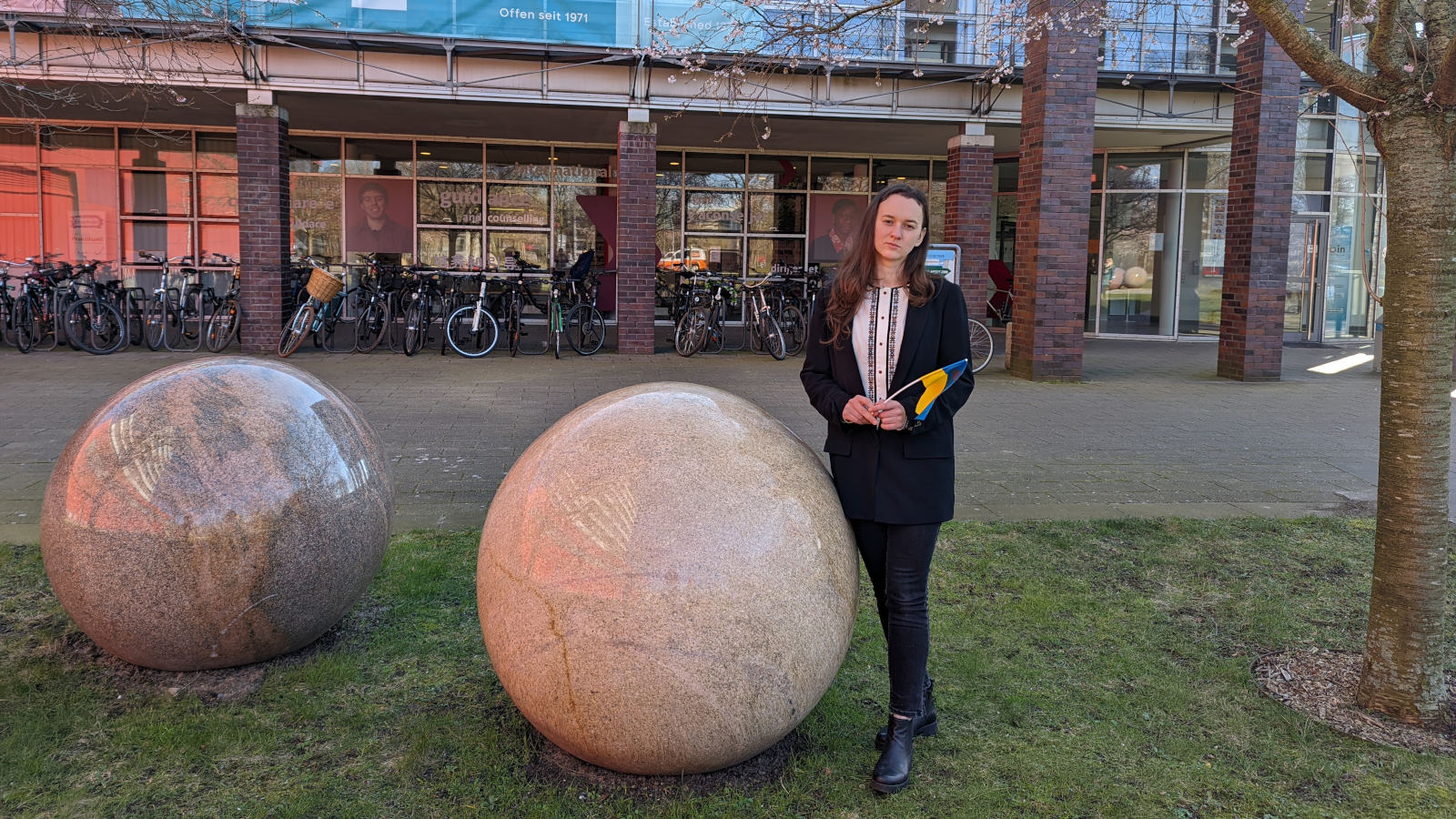
© Universität Bremen
How Did Ukrainians Experience the Beginning of the War?
The parents of Ukrainian researcher Evgenia Galytska were living in Kyiv when the war broke out.
„My friend said: “I heard fireworks, except I realized they weren’t fireworks, they were the sound of bombs.” Evgenia Galytska’s parents and friends were surprised by the first attacks on Ukraine in Kyiv on February 24, 2022. The young researcher has lived in Bremen since 2015. She told us about the shocking first day of the Russian attack.
The University of Bremen maintains several collaborations with Ukrainian universities, colleges, and scientific institutions. Many Ukrainians also work and study in Bremen. Evgenia Galytska has been working at the Institute of Environmental Physics since 2015 and her parents lived in Kyiv until the attacks.
© Universität Bremen
The Interview
My name is Evgenia Galytska. I have lived in Bremen for more than six years. I arrived to Bremen in 2015 to do my PhD in the Institute of Environmental Physics. In 2019, I defended my thesis. Since then I’ve been working as a postdoctoral researcher at the University of Bremen.
How did you hear about the attacks?
It was early morning and my husband woke me up saying that there are bad news. Upon waking up, one doesnt understand, “What does bad news mean?”. Then I grabbed my phone quickly to check what’s happening. There was a message from my mom. My parents are living in Kyiv and they’re early birds, so usually they wake up pretty early around five o’clock. That’s when she wrote the message: “We are hearing the sound of bombs.”
How did you feel?
In Kyiv, in Ukraine, they didn’t expect that this event would happen. So if we look back checking news, everyone kept talking about that there were actions happening. But no one to the very last moment believed that these things will happen, that the war will come to our country. When I called my mom it was a mixture of emotions of being scared, desperate, upset and not knowing what to do. I mean, you sleep in a peaceful town and you hear - as my friend said - “Hey I heard in the morning fireworks, except I realized they weren’t fireworks, they were the sound of bombs.” There are those who have to hide at night in the cellars or in the metro stations, in the underground, or they go to the bomb shelter. Imagine, when you buy an apartment and they tell you: “In addition there is a bomb shelter in your house”. And you think “Thank you, it’s not needed”. But apparently that’s what saves people’s lives nowadays.
What happened to your parents?
It took a couple of hours, but then my parents were preparing: cooking, buying water. The shops were still open. You couldn’t order food home from supermarkets but you could go and buy yourself. We were in touch once an hour or every two hours - we were calling. Then she called me and said: “We are leaving Kyiv”. My father drove 25 hours. That’s from the moment of not recognizing what’s happening, being scared, desperate, to running. And you don’t know where to run because from Kyiv you need to cross river Dnipro and there are not many bridges. People are desperate; they are also trying to run because they know that Kyiv is under attack. It took them 25 hours until they felt that they are safe.
How have friends and acquaintances fared?
Not everyone has left. I have contacted my professor who was the supervisor of my master’s thesis. He has two older sons and he said that both of them are in the army and he’s staying in Kyiv. And if needed, he will go and fight.
What’s next for you now?
I would like to do the most I can do. I think I can talk, I can spread the information, I can convince people. Those who still believe that there is a special operation happening in Ukraine –that it’s not true.
Most Russians are not equal to their president. They also have their opinion and very often their opinion is not equal to the actions and opinion of that president.
What do you think about the reaction of people in Bremen?
I was surprised to see how responsive people in particular in Bremen are. I can only talk about Bremen. There are not only voluntary organizations, but also people themselves are collecting clothes medicine and buying, organizing and sending. It’s unbelievable to see.
War in Ukraine: How You Can Help
The Research Centre for East European Studies at the University of Bremen would like to help refugee researchers from Ukraine, as well as colleagues in Russia who are in danger, to come to Bremen. To this end, they are awarding Hans Koschnick Scholarships at short notice and without bureaucracy.
We are asking for your help and donations to get the refugees to Bremen.
You can donate to our support association under the keyword: “geflüchtete WissenschaftlerInnen”:
IBAN: DE12 8306 5408 0004 8513 82
BIC: GENODEF1SLR
Deutsche Skatbank
We will gladly issue you a donation receipt. Please send a short email with your name and address to: fsov@uni-bremen.de. Thank you very much!
More information:
Website of the Research Centre for East European Studies